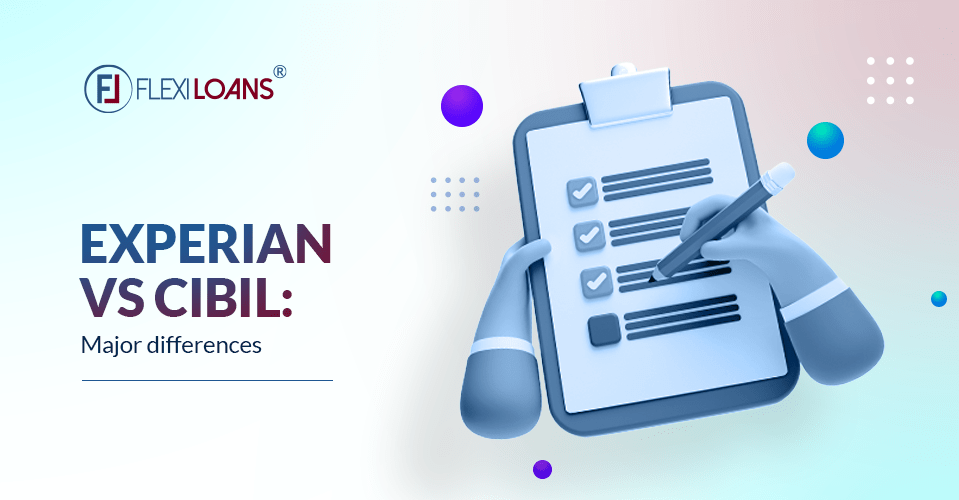May 22, 2022

For those who require credit regularly, having a good credit score is essential. When applying for a business loan or a credit card, the lender will always check our credit rating before granting the loan. The score will determine the terms and conditions of the loan, such as limit, interest rate, and the repayment period.
A significant reason behind the failure of businesses in India is the lack of adequate access to credit. Credit score also plays a major role in building up an image for the business. A business with a low credit score will not have a good reputation in the market and will create many more problems other than financing issues.
Credit reports and scores are calculated and issued to applicants by credit bureaus. In India, four bureaus offer credit scores. They are known as Credit Information Companies (CICs) and are licensed by the Reserve Bank of India under the Credit Information Companies (Regulation) Act, 2005. The four bureaus are:
- TransUnion CIBIL
- Experian
- CRIF High mark
- Equifax
Out of these four credit bureaus, TransUnion CIBIL score and Experian credit score are one of the most preferred credits which are relied upon by banks and other lending institutions to gauge the financial soundness of loan applicants. Read on to know what is Experian Score and CIBIL score and the difference between Experian and CIBIL scores.
What is CIBIL Score
CIBIL (Credit Information Bureau India Limited) is India’s first credit bureau and also the most popular one. It maintains credit files on 600 million individuals and 32 million businesses. CIBIL credit bureau was set up in 2000 at the recommendation of Siddiqui committee of the Reserve Bank of India and is part of TransUnion, which is an American multinational group. All major banks, financial institutions and NBFC are members of CIBIL and rely on CIBIL score to measure the credit worthiness of loan applicants. CIBIL scores are available for both individuals (on a scale of 300-900) and for business (on a scale of 1 to 10, where 1 is the highest rank for a business). There are three divisions in CIBIL, namely, Commercial Bureau, Micro Finance Institution Bureau, and Consumer Bureau for commercial enterprises which generates the Credit Information Report and CIBIL business credit score for their clients.
What Is Experian Credit Score
Experian is a 125 years old global credit rating company that offers its services in nearly 44 countries and has processed more than 3.5 billion credit decisions over the years. It is one of the most popular Credit Information Companies in India which provides global information services apart from credit services. It helps banks and other credit institutions by calculating business credit scores, which helps lenders in processing business loans. In a recent report by Forbes, Experian was awarded as one of the most innovative credit scoring companies in the world. The Experian credit score is calculated by taking into consideration various factors like credit type, existing credit accounts, credit utilisation, payment history, credit tenure etc.
Key Difference Between Experian and CIBIL
The key differences between Experian credit score and CIBIL credit scores are highlighted in the table below:
| Parameter | Experian | CIBIL |
| Year of establishment | 2006, license acquired in 2010 | 2000 |
| Products and services offered | For Consumers:Experian Credit Information reportFor companiesCustomer acquisitionCollection and money recoveryCustomer managementData and AnalyticsCustomer targeting and engagement | For Consumers:CIBIL TransUnion ScoreCredit Information reportMarket Insights, etc.For Companies:Portfolio Review reportsCIBIL Company credit information reportCIBIL Bureau Analyzer, etc. |
| Scoring parameter | Experian offers a credit score between 300-850, 850 being the highest. A credit score of 670 and above is considered as good. | CIBIL score offers a credit score between 300-900, 900 being the highest. A credit score of 750 and above is considered ideal. For business, the scale is 1-10. |
| Service fee | Rs.399 for Credit Report and Credit score) | Rs.550 for Credit Report and score. |
| Algorithm | Experian uses the FIFO algorithm for credit scoring purposes. | CIBIL, on the other hand, uses the model named Empirica. |
Experian Credit Score vs CIBIL Score
The debate on Experian vs CIBIL can be confusing for those who have no knowledge of the industry. Before selecting a credit agency, we should carefully weigh the pros and cons of both and make an informed decision. The following are some pointers which will give us an insight over the whole Experian score vs CIBIL score debate.
- Experian is comparatively more seasoned
Experian has been in the business since 1996 and has operated in many countries over the globe.
In terms of experience, Experian has a comparatively more exposure. CIBIL on the other hand is newer and operates only in India.
- Experian algorithm is more sophisticated
Though the methodology used by CIBIL is also decent, Experian uses an algorithm which collects and analyses data effectively to get meaningful interpretations and provides more scope for information to users.
- CIBIL has wider acceptability
CIBIL is the most popular credit rating for lenders. Nearly 90% of banks and financial institutions in India prefer CIBIL scores as the dependable source for credit reports. Many lenders would prefer to get CIBIL credit score for cross-checking, even if Experian credit score is available.
- CIBIL has higher customer base
CIBIL has been operating in India since 2000, while Experian got its credit license in 2010. CIBIL, therefore, enjoyed no competition for a long time and developed a huge scope during that time. CIBIL company enjoys more expertise and exposure in the Indian market and surpasses all contemporary credit rating companies by a huge margin.
- CIBIL is preferred by domestic lenders
CIBIL being for the longest time in the Indian market is well-equipped to handle the Indian business environment. As India is unique in terms of business conditions compared to foreign countries, domestic institutes are found to give higher preference to CIBIL. On the other hand, international institutions like Morgan Stanley, Barclays, and HSBC are more comfortable with Experian.
Summing up
As we have observed above, both CIBIL score and Experian score have distinct roles to offer for lenders as well as borrowers. Both credit rating companies use different benchmarks, methodology, and parameters to define credit score and prepare credit reports. While Experian uses an internationally acclaimed algorithm to arrive at a score, CIBIL is better suited for Indian businesses. For domestic small companies, CIBIL scores will be more acceptable by lenders, while for multinational companies, Experian may be a better choice. However, irrespective of which score is used, it is advisable to keep the credit score updated and attempt to maintain a good credit score.







